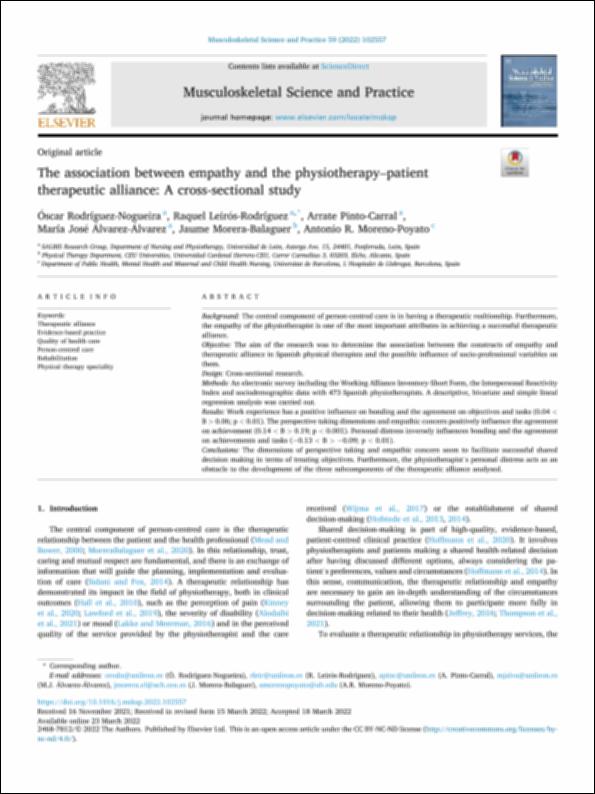Please use this identifier to cite or link to this item:
http://hdl.handle.net/10637/14421The association between empathy and the physiotherapy-patient therapeutic alliance a cross-sectional study
| Title: | The association between empathy and the physiotherapy-patient therapeutic alliance a cross-sectional study |
| Authors : | Rodríguez Nogueira, Óscar Leirós Rodríguez, Raquel Pinto Carral, Arrate Álvarez Álvarez, María José Morera Balaguer, Jaime Vicente Moreno Poyato, Antonio R. |
| Keywords: | Physical therapy - Decision making.; Fisioterapia - Toma de decisiones.; Empathy.; Empatía. |
| Publisher: | Elsevier |
| Citation: | Rodríguez-Nogueira, Ó., Leirós-Rodríguez, R., Pinto-Carral, A., Álvarez-Álvarez, M. J., Morera-Balaguer, J. & Moreno-Poyato, A. R. (2022). The association between empathy and the physiotherapy-patient therapeutic alliance: a cross-sectional study. Musculoskeletal Science & Practice, vol. 59, art.102557 (jun.). DOI: https://doi.org/10.1016/j.msksp.2022.102557 |
| Abstract: | Background: The central component of person-centred care is in having a therapeutic realtionship. Furthermore, the empathy of the physiotherapist is one of the most important attributes in achieving a successful therapeutic alliance. Objective: The aim of the research was to determine the association between the constructs of empathy and therapeutic alliance in Spanish physical therapists and the possible influence of socio-professional variables on them. Design: Cross-sectional research. Methods: An electronic survey including the Working Alliance Inventory-Short Form, the Interpersonal Reactivity Index and sociodemographic data with 473 Spanish physiotherapists. A descriptive, bivariate and simple lineal regression analysis was carried out. Results: Work experience has a positive influence on bonding and the agreement on objectives and tasks (0.04 < B > 0.06; p < 0.01). The perspective taking dimensions and empathic concern positively influence the agreement on achievement (0.14 < B > 0.19; p < 0.001). Personal distress inversely influences bonding and the agreement on achievements and tasks ( 0.13 < B > 0.09; p < 0.01). Conclusions: The dimensions of perspective taking and empathic concern seem to facilitate successful shared decision making in terms of treating objectives. Furthermore, the physiotherapist’s personal distress acts as an obstacle to the development of the three subcomponents of the therapeutic alliance analysed. |
| Description: | Este artículo se encuentra disponible en la siguiente URL: https://www.sciencedirect.com/science/article/pii/S246878122200056X |
| URI: | http://hdl.handle.net/10637/14421 |
| Rights : | http://creativecommons.org/licenses/by-nc-nd/4.0/deed.es |
| ISSN: | 2468-7812 (Electrónico) |
| Language: | es |
| Issue Date: | 13-Jun-2022 |
| Center : | Universidad Cardenal Herrera-CEU |
| Appears in Collections: | Dpto. Enfermería y Fisioterapia |
Items in DSpace are protected by copyright, with all rights reserved, unless otherwise indicated.


